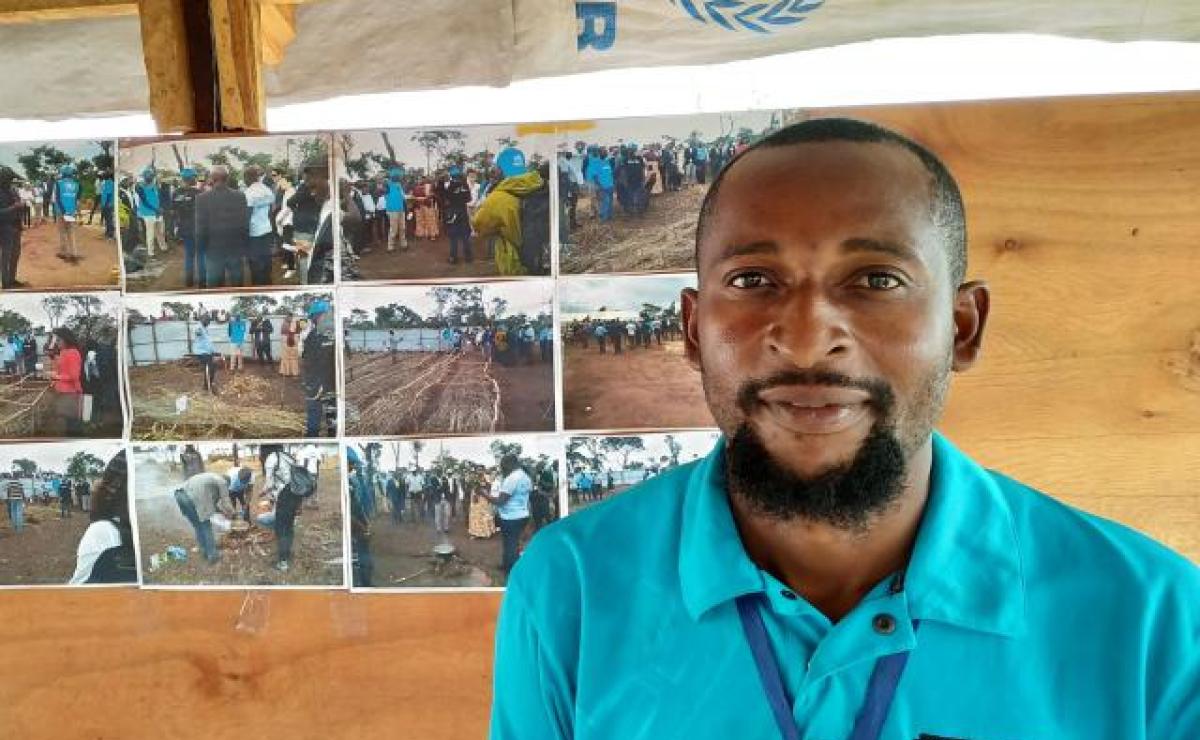From teacher to farmer

A refugee from the Kasai (DRC) talks about his new life in Angola
(LWI) - The outbreak of violence in the Kasai region of the Democratic Republic of Congo in April 2017 triggered the internal displacement of some 1.4 million people and the flight of over 31,000 refugees to Northern Angola. Many have lost loved ones and are traumatized.
LWF was among the first humanitarian actors assisting the DRC refugees in Dundo, Northern Angola. The organization established Lovua camp, installed shelter, water tanks and latrines and is now responsible for the entire infrastructure in Lovua, which includes a system of solar panels, a transit centre, and the medical centers. Since January 2019, LWF Angola is also responsible for livelihoods and resilience. The trainings and coordination are being done by the refugees themselves, who work for an incentive for LWF. One of them is Mputu Muyembi (36), a teacher, married with two children. He arrived in Lovua in August 2017.
“I was a teacher for the government military staff. My family and I became victims of the tribal conflict. Our journey started on 24 June 2016 from Kasai in Kananga province, DRC. We traveled 340 kilometers in two days to reach Kamako district bordering Angola. It is not an easy story to narrate. We were finally received by the Angolan government on 13 April 2017.
Arriving at the settlement was very hard. Lovua was a thick bush and more remote than I expected. When we arrived, I thought about how to protect my family from snakes and other wild animals, while setting up our tent. But I also was very keen to get involved in various volunteering activities conducted by organizations working in the settlement. Of course, I was hoping that one day I would be engaged by one of the aid organizations.
I got lucky. Since 9 November 2018 I have been working as a Farm School Coordinator for The Lutheran World Federation (LWF). LWF has set up a demonstration plot in the settlement, to train refugees and host community members in various agricultural techniques and methods. In this plot we have a variety of vegetables and crops. We have several flower beds allocated to specific types of crops The training includes manure and compost making.
We also have an area where we do small animal husbandry. LWF promised to distribute goats to some members of our group and we will raise and breed them as demonstrated.
I am now becoming an extension officer. I enjoy working with my colleagues. We are 20 community mobilizers, five of whom are women. Our role is to mobilize the farming community in the settlement to participate in agricultural training and to supervise their work in their groups and on their individual farming plots. We also promote the importance of farming in the communities as a source of livelihood and self-reliance, rather than sitting back and waiting for WFP [World Food Programme] food rations.
I have gained knowledge and experience in farming: From a teacher to a farmer! My new knowledge helps me at home and I will use the farming techniques and experience when I go back to my country. I also receive a weekly incentive allowance which allows me to take care of some basic household needs.
When I go back home, I will start my life with this experience gained from my time as a refugee. I sometimes wonder how I have moved from sad moments to gaining new experience.
LWF has been working in Angola since 1986, as one of the major aid organizations providing emergency relief and rehabilitation at the height of the Angolan civil war. Since the peace agreement in 2002, support to Angola has transitioned to a long-term development program focusing mainly on integrated rural development, land rights and human rights through the UN Universal Periodic Review process. The new country strategy from 2019-2024 will focus on three programmatic areas, namely livelihoods, quality service, and protection and social cohesion. Emergency assistance in natural and man-made disasters remains a key activity.
Interview and transcript by Abrao Mushivi, LWF Country representative in Angola

